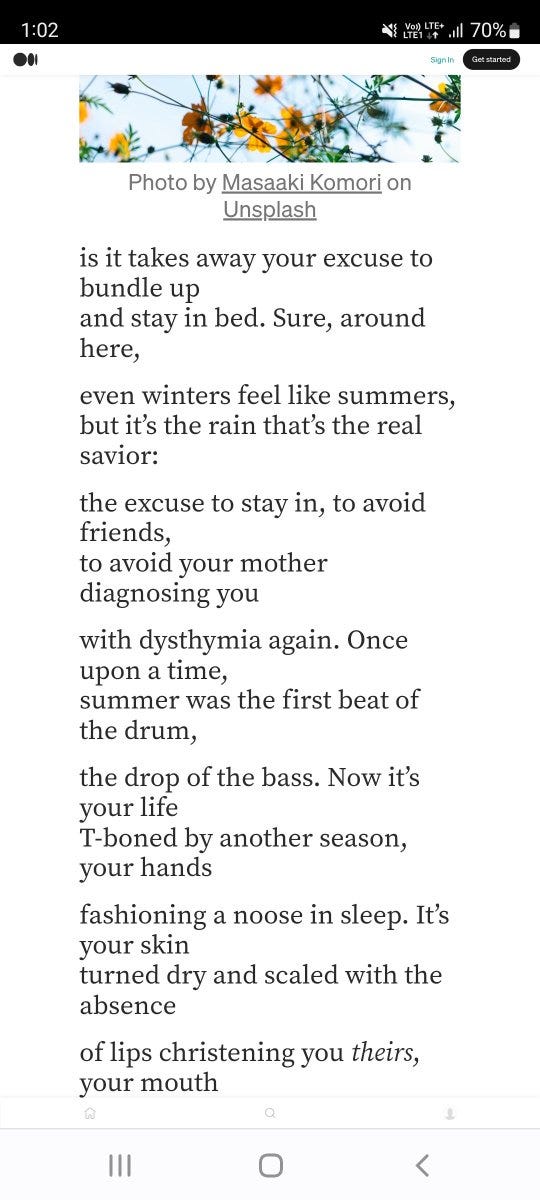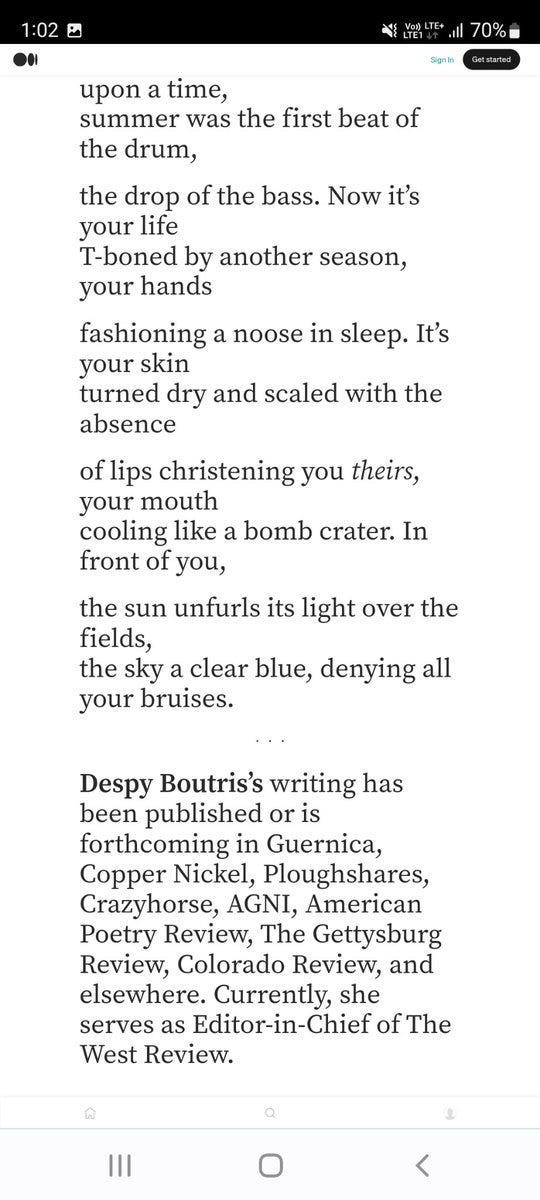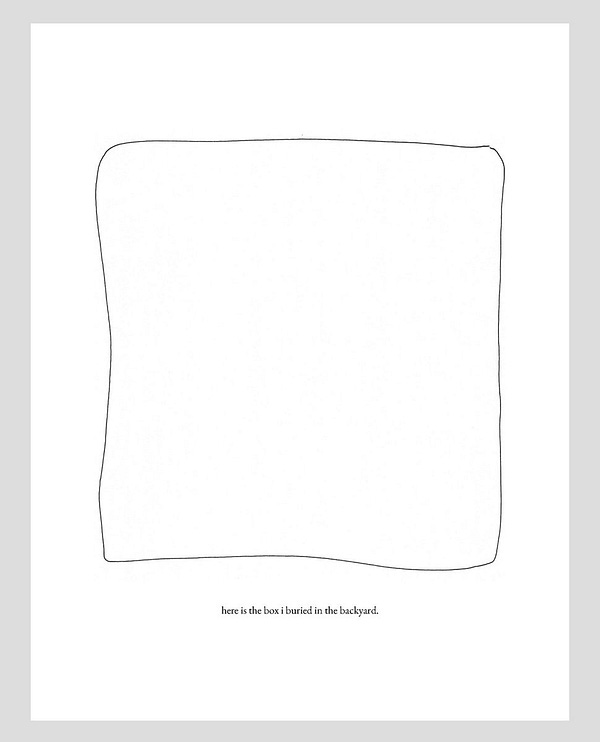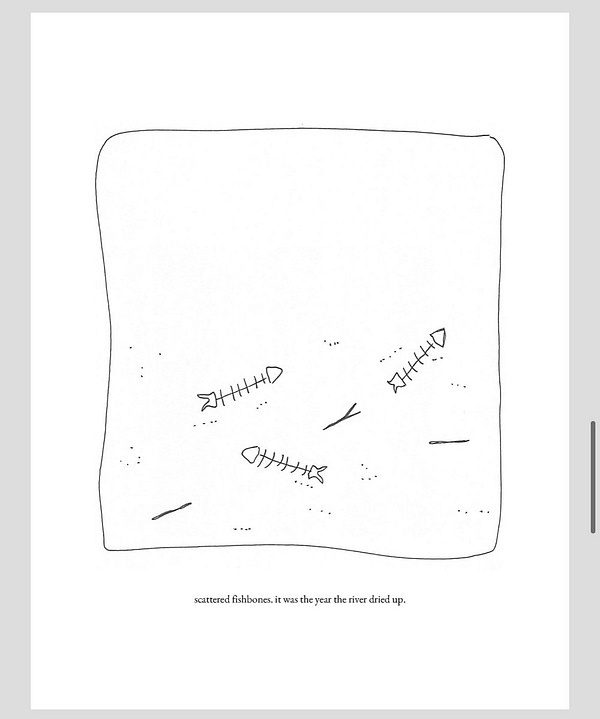Happy Monday, folks!
Hope you’re all doing well! I’ve been quiet because I’ve been suffering. I’m still suffering, but here’s some fun content for you anyway. (A lot of content—please open this email in a new tab to get to the end!)
What I have for you today:
Housekeeping
Love letters
What I’m reading
Quotations (so many quotations!)
Tweets
Housekeeping:
I have a lil art out in print.
Love letters:
Big hugs to everyone below. You’re the best & I adore you.















What I’m reading:
I am, am I, to trust the joy that joy is no more or less there now than before, Evan Kennedy (don’t think I’ll finish it; feels somehow both unedited & pretentious)
Cruising, Alex Espinoza (love it; very comprehensive & yet pithy history of cruising. 5/5 stars.)
Short Film Starring My Beloved's Red Bronco, K. Iver (my favorite book of the year, probably)1
The Soft Butch That Couldn’t (Or: I Got COVID-19 in March and Never Got Better)
The Biological Causes of Mental Illness Cannot Be Separated From the Social Ones
Quotations:
I am still in disbelief that the alphabet before you stands in for the sounds that I have been making.
-Evan Kennedy
I wish to be admitted continually to a gentler order.
-Evan Kennedy
The distance between sensation and its articulation is the cause of so much of my worry, and yes, reconciliation, especially when the dynamic of the social is at play among listeners with whom I spend this tremendous time, and those I regret ever having met.
-Evan Kennedy
And to have come this way
for nothing. To see my own skin’s
shallow glow against the cool
wood of the porch swing.
-Joanna Klink
Have I not changed at all,
folding my legs beneath me, bracing
for the next unspoken need, the blind demand
to stand and shoulder what I had no
hand in creating.
-Joanna Klink
Love is quiet. Something that is
not love barrels over it.
-Joanna Klink
Of the 5,500 children separated,
545 parents cannot be found. My husband’s voice
raised quivers. Volume, he says,
is not the best measure, but it’s often where we start.
-Joanna Klink
Some of what we’ve done has been kind
or mattered, binding us to strangers,
smiling toward the disheveled place
where the fence dissolves.
-Jack Christian
Now pulses of carlight arc
up over the firs. Now brightens the milkweed in our forms.
-Bradley Trumpfheller
Image: a net fashioned of your grandmother’s hair,
its crucifixed grammar. Image: a meadow and then a meadow, backwards.
-Bradley Trumpfheller
I want to mean this unviolently: when he vanished
his hand in me, I could only look at myself in the mirror.
-Bradley Trumpfheller
Tell me the song that starts with the windows,
the storm asking permission to pass through.
-Bradley Trumpfheller
At my worst I was tedious.
At my best I went outside.
-James Davis
poems are never summer
they want to be written
about the cold crackling
in my spine
-Johannes Goransson
Of all the words
in the marshes, I said
creek. To want to
stop speaking.
What else is
expected?
-Nica Giromini
I meant, before, inside was a persimmon, permission. I thought she could fig me out. I thought she could discover me. Forgive me.
-Kameryn Alexa Carter
I’d never unknow that face
and the look of it.
-Dustin Pearson
The way some people are about weeds: I’m not
as forgiving. I see a weed and could will a knife
out my eyes to gouge its root.
-Cate Marvin
& the sky, no less holy, abandoned,
hemorrhaging light.
-John Sibley Williams
I wanted to be
desert
deserted roadside motel
no vacancy
-Sarah Green
We’ve abandoned
the field to winter, and winter’s trance
of ice, hemmed by the wrecked wire fence
whose rusted barbs can still
snare skin.
-Kasey Jueds
How not to count
the days or hours till then: if
you will draw near, if you
will teach me—please, teach me this.
-Kasey Jueds
I appreciated the way that you wrote about the concept of the closet, of how there's a predominant idea that being closeted requires some level of awareness that you are closeted, or awareness that you are queer — but that that's not always the case. Sometimes the closet can be characterized by a realization you haven't had yet, as opposed to an active denial.
But I think back to the part of the book that's about the date that I went on [with a woman] when I was like 20. Despite the fact that I came out of that feeling like, Wow, that was incredible, I had no idea how big, how expansive I could feel. I felt like a better person for discovering that I could be attracted to her, that I could be attracted to all kinds of people, not just men. But at the same time, I never came away from that with this lingering sense that I was queer. I just felt like myself, and I was attracted to men, every time except that one time when I was 20. 2
I started writing the book thinking, like, I want to figure out what I am, and by the time I was thoroughly immersed in it, I was just like, I don't even need to have a name for this anymore. I believe that it is enough that this is how I am. I don't need a name for it.
My neurosurgeon likes me, as a person; I can tell because in my after-visit notes from the first time I saw him, he wrote that I was “bright and amiable” and transcribed what I told him when he asked if my neck cracked when I moved it: “like an undead lich rising from an ancient throne in his tomb in the empire of necromancers.”3
Every morning now when I wake up, I sit up slowly in bed and lean back against my headboard. I drink a full liter of water, eat some salted almonds, put on my compression socks for the day, and take a beta blocker for my heart and an SNRI to keep my adrenaline more in check. After 30 minutes, when my body has adjusted to sitting up, I can stand.
Downstairs, I make the first of three Liquid IV drinks of my day and eat a small breakfast. I drink four liters of water, total, and take more SNRIs and beta blockers as the day progresses. I sit on a stool when I take a shower. I sit down at a little portable table to do all the vegetable chopping and potato peeling for our meals. I wrap an ice scarf around me and sit down near the oven to cook. I use my office chair to wheel around the kitchen when I’m putting away groceries or dishes. I use a cane when I leave the house, which I only do for doctors appointments; it folds out into a stool so I don’t have to sit on the ground.
My cardiologist asked me on my second visit how I was adjusting, emotionally, to having a disability.
I said, “Do I have a disability?”
She said, “Well, yes. I thought you knew.”
Is a soft butch a soft butch if she can barely hold even herself together? Is a soft butch a soft butch without her swagger?
Going out with Billy felt different. We met around the one-year anniversary of Jamie’s death, but didn’t go on our first date until several months later. From the start, we talked openly about grief and didn’t shy away from sharing how our respective losses had shaped our lives.
The real kicker, though, came a couple of months after we started dating.
We’d gone to a party together and returned back to my house, happy and giddy, basking in our beginning-of-a-relationship glow. But the mood shifted once I remembered what I had planned for the following day. My therapist and I had agreed that it was time for me to revisit the place where Jamie died. Suddenly, feeling giddy felt wildly inappropriate.
I told Billy that I needed to reconnect with Jamie. I wanted to watch some old videos of him, to witness proof of his vibrant life before visiting the site of his death. I gave Billy the option to leave or to stay and watch the videos with me, warning him that if he chose the latter, there would be plenty of tears.
Billy decided to stay. And we both cried. As we watched footage from Jamie’s 30th birthday, Billy began to sob.
“What’s wrong?” I asked, handing him a tissue.
“I just realized that falling in love with you means falling in love with Jamie,” Billy replied.
I will never, ever forget those words.
It took me a while to figure out that I could fall in love with Billy without falling out of love with Jamie. Despite what my sweet dumb brain told me, my current relationship wasn’t at odds with my past marriage.
Now, Billy and I own a home together in Atlanta, the city where Jamie and I met and became adults. We sleep in a bed with a headboard that my husband built. Our house holds various reminders of Jamie, including a painting of J and our dog, Henry, sitting on the stoop of our old home. That painting was a Christmas gift from Billy—a gesture that told me that he wanted to live with and honor my love for Jamie. Now it hangs in our living room, where our almost-two-year-old daughter loves to look at it.
We were familiar at once — I put my hand on his knee — we understood. He did not get out at the end of the trip — in fact went all the way back with me.
-Peter Doyle, of Walt Whitman
What does it mean to be too sensitive to rejection? Who gets to decide that on another person’s behalf? And how might life experience and vulnerability lead a person to become more attuned to signs of rejection than other people are? And if a person is already disabled, and thus already in a more marginal position in society, doesn’t being more careful about avoiding rejection simply make sense? What’s disordered about recognizing that you need human support, and freaking out when you’re facing the risk of losing it?
Some patients don’t just dwell quietly in their suffering. They take action, and kick and snarl and cry out for help, forcing others around them to grapple with the enormity of what they’re going through. That doesn’t sound disordered to me. That sounds like killer self-advocacy. It’s sitting around, glumly compliant, being patient with your pain that strikes me as dysfunctional.
Some trans people will not endure living in a gender role they never consented to be forced into. Even if the state or the medical system does not grant them the freedom to live as they truly are, they’ll take that freedom for themselves, no matter the risks necessary. That impatience with anguish — that willingness to fight for a better life — is gender dysphoria. It’s being unwilling to bear the pain that society created for you anymore, and taking your own body, endocrinology, identity, and future existence into your own hands.
Some children who have repeatedly been mocked, condescendingly corrected, ostracized, and judged throughout their lives find the pain of rejection too much to bear. They refuse to hold society’s punishing social standards within themselves anymore. They freak the fuck out when they’re told, in so many words, that they’re being too dumb, too loud, too annoying, too clueless, too immature, too needy, too much themselves — and in so doing, they communicate that it’s wrong for a society to ever tell children those things. That’s rejection dysphoria. An unwillingness to accept the negative things you’ve been told about yourself all your life.
No wonder neurodivergent children, who are more prone to a certain kids of ‘mistakes,’ would be particularly panicked about doing “too much” wrong and losing everything. That’s not disordered. But it is dysphoric. Who among us wouldn’t find the threat of constant rejection to be too much to bear?
I’m sensitive to rejection because I have been rejected a lot — often for simply being me. And I’ve been dismissed and disposed of by other people so frequently that the fear of dying completely alone with zero support is baked into my bones.
I might strike a non-disabled person as being filled with irrational social panic, but really, I’m just accurately recognizing a pattern in my life. Why would I expect anything but ostracism? Noticing a real-life pattern of social disposability is not a disorder on my part. If anything, that’s my biology and my psychology working correctly, adapting and trying to protect me.
In the twitter thread that I mentioned above, one person replied to me saying that RSD is a mental illness “symptom” because it often involves spiraling out in overwhelming sadness after being rebuffed in a totally ‘mundane’ way, such as being passed over for a job. But being jobless isn’t actually mundane, is it? We all require money in order to have housing, healthcare, and food. If we are passed over for enough jobs, we’ll no longer be able to survive. And neurodivergent people are unemployed & under-employed at far greater rates than our non-disabled peers. So why the hell wouldn’t we be freaked out by the prospect of not finding work?
Calling the fear of unemployment ‘rejection sensitive dysphoria’ is just another instance of psychiatry assigning a negative value judgement to a very logical conditioned response. If you can’t find work, you might die, and if you have a disability it’s extra hard for you to find work. Of course you’d feel dysphoric when you get rejected for a position that could have put food on the table, yet again.
Many of the realities of living under capitalism are horrifying — we’ve just all been taught to act like they’re mundane. When disabled people refuse to pretend that our exclusion isn’t a life and death matter, we get punished further for it. We are told we are over reacting. We’re said to be too sensitive. We get labeled as disordered. But really, we are just dysphoric — we are naming a pain that society expects us to silently bear, and with our loud, defiant responses of anguish, we are telling society we refuse.
Off of T , my eyes themselves had gotten bigger. I looked more doe-like, cute and tragic. Strange men on the sidewalk started talking to me. Even with a mask on, I was getting missed and ma’amed again. An old guy in a plaid suit carrying a Bluetooth speaker came up to me and told me over and over that he was going to take me out dancing, and he was gonna buy me a dress. A middle-aged white dude in a jean jacket sat down across from me on the patio of a Starbucks, and handed me a gold Sacajawea coin. The women always want that one, he told me. A few other random men — baristas and coffee shop patrons — asked me what I was studying in school.
When I had been a boy, people knew I was a professor. As a girl, I was a young hapless student again. And people assumed I wanted to be talked to.
That’s really what transition and detransition, was like for me: a powerful, at times unpleasantly raw connection with myself, followed by a desperate, deadened attempt at disconnection. When I was a man, I felt fully self-possessed and real. But this made my boyfriend’s rejection of my male form all the worse. At times, I felt that it was worse to be rejected for who I truly was than it had been to be loved for who I wasn’t. When I hid my testosterone away, I wanted to return to the state of unknowledge, to detransition not just my body, but my entire self concept.
I wanted to be wanted. I didn’t want strangers to like my mind, I wanted someone I loved to need my body. I wanted to be nude with a firm hand around my throat. I wanted to be proud of all my body’s soft and hard parts. I wanted to drool and drip with arousal and not think for a second that anyone was silently disgusted by the size of my need.
My body is not a puppet, a loyal dog, or a dead thing that exists outside of me, it is who I am — and even more miraculously, I like who he is.
I don’t want to make political work my identity — I just want to live a life I can stand.
Can I come to genuinely believe what I claim to believe — that none of us owes a debt to the universe, that we are the universe, and simply living as our honest selves is enough?
Growing up alongside people who routinely voted against my wellbeing was a quietly devastating experience. It’s something I will never cease being angry and wounded about.
I am sick of the self-martyrdom of activism, the pissing contests over who has gotten the least sleep, retraumatized themselves the most, and has the most razor-sharp take on whatever’s trending.
The late David Graeber always resisted being called an anarchist. He said that anarchism is a thing you do. John Holloway says that the way we do away capitalism is by refusing to remake it every single day, locating small cracks in the system and exploiting them subtly wherever we can, preserving the lives and dignity of other people anytime we can. A philosopher friend says that wherever we are, that is the location of our struggle. Whatever we are holding at present is our most powerful tool. All of this brings me comfort. It also empowers me, in a very manageable and undramatic way, instead of making me feel guilty that I am not doing enough, or doing it grandly.
When you help two strangers on the street manage a conflict without resorting to calling the cops, you are doing something greater than activism. When you look after your neighbor’s child when they are sick instead of getting social workers involved, you’re doing something greater than activism too. When you trust that someone is who they say they are without demanding paperwork from the state, a school, or a psychiatrist, you’re building a less authoritarian world. When you let your coworker snooze on the clock, you’re unmaking capitalism. You are small and important. You will only ever make millions of tiny differences. That is more than enough.
loss is often expressed in an arrangement of foliage, the same as love
-Josh English
I think language is asymmetrical, my ear pressed against the arm of a chair, a sweater rolled into a pillow, we say patience but what we really mean is waiting
-Josh English
loss is not the absence of form, it’s a form of absence, it carves a little hollow in the chest that gets filled with rainwater
-Josh English
there are two formulas for water: one involves science & the other a hollow
-Josh English
I went back to the woods but the shadow had passed & the wineberries were already ripe—I stood facing the child me who never liked wineberries, who found their brand of sweet a little sickly, a bit tart, although now I remember less their taste than the way the fruit plucked from the sepal, the satisfaction of coming unstuck
-Josh English
At last, picking thorns, we emerged into a clearing
where carnivorous flowers grew from a fine gray ash,
sky like the rheumy blue of a blind man’s eyes.
-Will Cordeiro
We kept shedding fragments
of ourselves, translucent rags like serpent skins.
-Will Cordeiro
Once I was beautiful. Now I am myself.
-Anne Sexton
I, for instance,
am childless and, therefore, most likely
will die alone, my nest feathered
with yellowing poems.
-Kevin Prufer
For instance, I am alive, right here,
in the middle of my poem, having had, perhaps,
too much to drink.
-Kevin Prufer
It is as if life itself were rung like
rain from the evening air: drenched in a
mist of what’s missing: a hyacinth
in gray scale: windy gaps in
the erased spaces where the
dotted line of lineated mountains
once stood.
-Dean Rader
Call-to-action:
Read the newest issue of The West Review & share the poems widely. Buy the writers’ books. Be generous with your praise! Life is hard enough as it is!
& a little writerly wisdom for you:
Whether you are published or not, the task becomes more and more simple, I think, as you move forward. The task is to continue writing, continue reading. Keep traversing this road we’ve chosen, even if you can’t see very far in front of you. As my mother would say, that’s the time to step out on faith. Living life as a writer, ultimately, is about stepping out on faith.
Tweets:




That’s all for today!
Please buy things so that I can pay my rent. Love you.
-Despy Boutris
Instagram
Twitter
Website
& it’s officially available for preorder! Buy a copy here.
This is funny. I love this.
This is also so funny.












